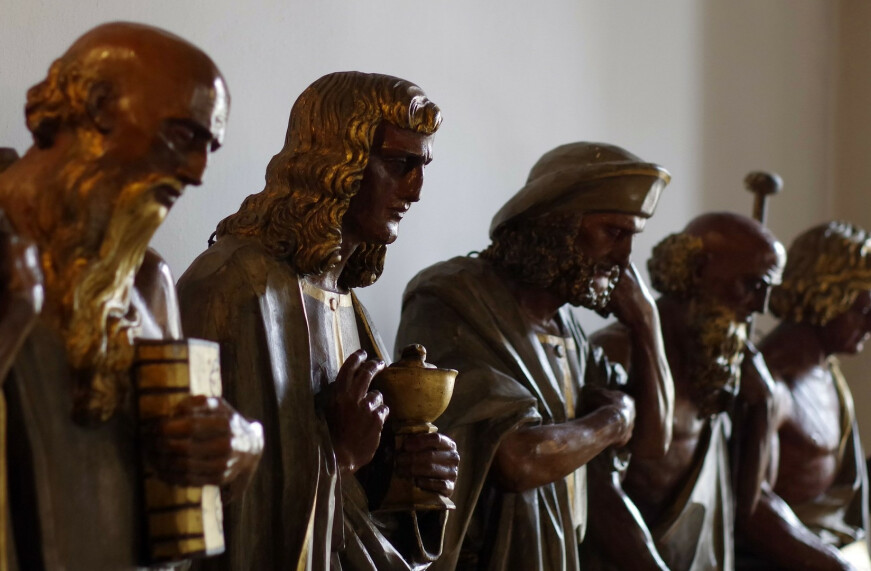Philadelphia
Address
3415 N. 2nd Street
Philadelphia, PA 19140
Service Times
Sunday 10:00 PM
Contact
215-660-9723

Easter Sunday is the most significant day on the liturgical calendar for a Christian. It is the culmination of an entire week focused on the sacrifice of our Lord Jesus Christ. Christians around the world join together to worship and celebrate the risen Lord and their adoption into the family of God. All too often though, the festivities of Easter are followed by an adrenaline dump and a sense of malaise for believers. For most churches, attendance is traditionally low the week after Easter. We must ask ourselves if this is appropriate. Is there biblical precedent for this waxing and waning? How did the disciples carry on after the resurrection?
The first Easter for the disciples was not necessarily the end of something, it was the beginning. Acts 1:3 show us that, after the resurrection, it was another 40 days until Christ gave the Great Commission and ascended into heaven. From all accounts, the passion of the disciples only grew from that point on. It is important to note that the disciples, before spreading out to different areas of the world, only knew Jesus for 3-4 years. That short time left an indelible mark on these men. Their zealous impact for the Kingdom was realized in the years and decades after the resurrection and ascension, not before it.
What exactly did the future hold for the disciples? History offers us some insight. According to historical record, the apostle James was beheaded in 44 AD under the authority of King Agrippa and was the first recorded martyred apostle (~10 years of ministry). Simon Peter died a martyr’s death between 64-68 AD under the persecution of Emperor Nero (>30 years of ministry). The apostle John died in 100-105 AD after being exiled to the Isle of Patmos and finally traveling to Ephesus after his release (~70 years of ministry). The disciples went on to lead ministries that lasted decades in most cases. Suffice it to say there was no shortage of fervency among the disciples after the first Easter. They certainly did not rest on the laurels of the previous 3 years. They traversed the globe by land and sea to share the gospel of Christ, and often met gruesome ends because of it.
What kind of an effect has Easter had on us? It’s so common for us to treat Easter like any other holiday, forgetting the historical event that it commemorates. The encounters Christ had with those during his life and after His resurrection effectuated meaningful change that had the power to endure. The modern day “church fatigue,” that most seem to experience is more likely the product of buying into a secular understanding of Easter. A biblical understanding produces something very different in the life of a believer. This year, may we line ourselves up with Romans 12:11, so that the typical fatigue we have grown so accustomed to would be replaced by an irrepressible excitement, fervor, and zeal to serve our Lord.

The past few weeks have been nothing short of unprecedented, both here in the United States, and across the world. The effects of Covid-19 on society have been massive as "social distancing," has become common place. Schools have closed, church gatherings have ceased, and businesses have all but shut down, as unemployment has skyrocketed. Covid-19 has now become part of our lexicon. We are regularly inundated with statistics about new positive tests, and rising death tolls every time we turn on the television.
So what is Covid-19 exactly?
The Center for Disease Control describes Covid-19 as a respiratory illness that can spread from person to person. Patients who have Covid-19 have experienced mild to severe respiratory illness with symptoms including fever, cough, and shortness of breath. The most severe cases have even resulted in multi-organ failure and death. The virus is certainly more contagious than the common flu, and in some cases, far more severe.
It is important to note that Covid-19, just as any other illness or malady, is a constant reminder of the world’s broken state. The very moment that sin entered the world, it's effects were immediately felt by humanity. Genesis 3 details how both man and woman went from a perfect form, to one that experienced pain, toil, and hardship. While woman was cursed to experience pain in labor, man was cursed to experience pain by the work of his hand. As sickness and disease followed, they were only the beginning, as an eternity apart from God was the ultimate consequence of sin.
So where does the Christian find hope?
What’s comforting is that the bible makes no illusions about our mortality. A physical death is not only inevitable, it is to be expected. Fathers of the faith like Abraham experienced a physical end just as much as the most villainous characters of the bible. In regards to our eternity though, the bible is clear that apart from the intervention of God, we are in fact, hopeless. The bible describes salvation as a gracious gift through Christ Jesus. By putting on the righteousness afforded to us by Christ, we are counted as redeemed. 1st Corinthians paints the picture beautifully in the following verse:
“For the perishable must clothe itself with the imperishable, and the mortal with immortality. When the perishable has been clothed with the imperishable and the mortal with immortality, then the saying that is written will come true: Death has been swallowed up in the victory.” - 1 Corinthians 15:53-54
Though our earthly bodies will continue to be susceptible to this virus, and any new ailment that comes down the pipeline, we find peace in the fact that we as Christians have been clothed with something that is imperishable. Yes, this flesh will diminish in strength and eventually wither away, but we who have put on immortality through Christ Jesus have been reconciled to God, and have a hope beyond this world. Our hope is alive and well, and that is something no virus can take away.

Amidst all the interest in hurricanes, perceived rampant police brutality, and political strife, a seminal event in history will soon be commemorated. October 31st will be approximately 500 years since Martin Luther, the German theologian and protestant reformer, posted his 95 thesis on the Castle Church in Wittenburg, Germany. The importance of this event cannot be overstated, as it changed the landscape of Christianity as we know it. As October 31st approaches, we must ask ourselves, does today’s body of believers really understand what the Reformation represents? According to recent polls done by the Pew Research Center, the answer is a resounding, “no”.
Numbers Don’t Lie
A poll conducted by Pew in May of 2017 among U.S. Protestants and Catholics showed that 41% of U.S. Protestants believed that their religion was different than that of U.S. Catholics. 57% of U.S. Protestants though, believed that their religion was similar to that of U.S. Catholics. What do these results tell us about the beliefs of today’s typical churchgoer? Could It be possible that 57% of the church body believe that they have similar beliefs to Catholics, and if so why? Before attempting to answer that question, what was the Protestant Reformation and why was it significant?
The Protestant Reformation took place in 16th century Europe. It literally pulled believers from a system in which salvation was purchased from the Catholic Priesthood through, “indulgences,” into a faith-based salvation. Salvation was no longer a concept based on works and the good deeds of man. The Reformation was focused more on the scripture as authority, rejecting concepts like justification through deeds, and purgatory. Obviously, the reformation and its initiators were not well received by the Catholic Church at that time. The conflict between the two led to the origins of The Thirty Year’s War, which was the most deadly European religious war of all time. Clearly the differences between the two stances on faith were worlds apart. They were so different that blood was shed. So why have those differences softened over the years?
The Blame Game
The initial tendency would be to blame the culture that surrounds us. The real blame though should likely be placed somewhere else, the pulpit. Scripture says the following…
“Preach the word; be prepared in season and out of season; - with great patience and careful instruction. For the time will come when people will not put up with sound doctrine. Instead to suit their own desires, they will gather around them a great number of teachers to say what their itching ears want to hear.”
Paul makes it very clear to Timothy that there should be an emphasis placed on preaching the word. He warns that a time will come when people will seek out those who will preach a gospel that pleases their ears. From the looks of the current landscape, that time is now. With televangelists, prosperity preachers, and recent movements that have been designed to attract youth, false doctrine is running rampant. The danger is that a gospel that pleases the ears is not the gospel at all. Paul places that onus of responsibility on the preachers to preach the word in all seasons. It’s easy to understand that people who are subject to poor theology would think that their beliefs are similar to that of Catholics. Sermons that are solely designed to put smiles on faces would not bother with concepts like sovereignty, human depravity, and salvation through faith alone.
Where Do we Go From Here?
As Christians in today’s church, what is our response? One of the most beautiful things about that day in Wittenburg was that it represented the believer’s ability to read the scripture and cross-reference what they heard from the pulpit for themselves. As we come closer to October 31st, let us recognize that theology is important. It’s not something that should be left to those in seminary. It is literally the responsibility of every professing believer. A deeper understanding of God will ultimately lead to a deeper walk with Him.